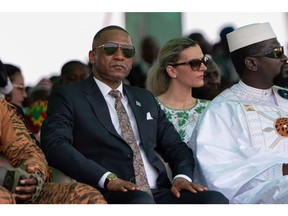Article content
(Bloomberg) — Botswana’s government will develop new industries, dismantle the state power utility to foster private investment and increase concessional borrowing as part of a plan to diversify the diamond-dependent economy, President Duma Boko said.
Article content
While gems mined by Debswana — a venture between Anglo American Plc’s De Beers unit and the government — account for 80% of Botswana’s economy, they aren’t creating enough jobs, which raises the risk of instability in the arid nation of 2.5 million people, Boko said in an interview. The country is mainland Africa’s richest relative to the size of the population.
Article content
A Harvard-educated human-rights lawyer, Boko pulled off a major upset when he unseated the party that had held power for almost six decades in elections in October, with his campaign pledge to switch course on the economy finding resonance among citizens facing declining living standards. More than one in four people in Botswana are unemployed.
“The levels of growth we have seen in the past were unfortunately jobless,” Boko, 55, said on the sidelines of an energy conference in Dar es Salaam, Tanzania, this week. Of the unemployed, the “majority are young people. It’s a huge risk,” he added.
The election took place against the backdrop of a prolonged downturn in the diamond market, which stymied economic output and led to widening budget deficits. Boko’s Umbrella for Democratic Change coalition won 36 seats in the 61-seat legislature, while the Botswana Democratic Party that had ruled since independence from the UK in 1966 was reduced to just four seats and its leader, Mokgweetsi Masisi, was denied a second term as president.
“The direction was not quite where the country should be going,” Boko said. “We have an obligation then to steer it in the direction that the populace sees as the best.”
Article content
Botswana has an annual per-capita income of $7,820, higher than that of oil-rich Gabon at $7,802, and of South Africa, the continent’s biggest economy, World Bank data shows. Even so, there are few employment opportunities and limited headway has been made in reducing its reliance on mineral extraction.
Boko has moved swiftly to cement a new-long term deal with De Beers to ensure economic stability.
He’s also intent on developing “climate-smart” agriculture and the so-called digital economy, expanding an already successful wildlife-tourism industry and promoting more local processing of minerals so that “we do not cart our ore out raw.” Another priority is to reduce Botswana’s reliance on coal to generate electricity and up its output of renewable power.
“We are going to be actively developing our solar-energy capabilities” and by 2030 that technology should supply half of Botswana’s needs, he said. While the country ordered a new coal-fired power plant from Jindal Steel & Power Ltd. in 2022, he sees it as unlikely it will commission any more.
Botswana has one of the continent’s lower debt-to-gross domestic product ratios and that puts it in a position to borrow more to fund its development programs, according to the president, signaling a shift from the previous administration’s practices.
Article content
“We have had talks with the World Bank, we have had talks with the African Development Bank. They have indicated to us that our uptake of facilities that they have to offer has been very low,” he said. “These are huge opportunities.”
Boko plans to press ahead with a long-mooted plan to unbundle the loss-making Botswana Power Corp. into generation, transmission and distribution units, and invite private investors to participate in transmission.
“There has been a change of guard,” he said. “We trust we will see growth.”
Sign up here for the twice-weekly Next Africa newsletter
—With assistance from Mbongeni Mguni.
Share this article in your social network

